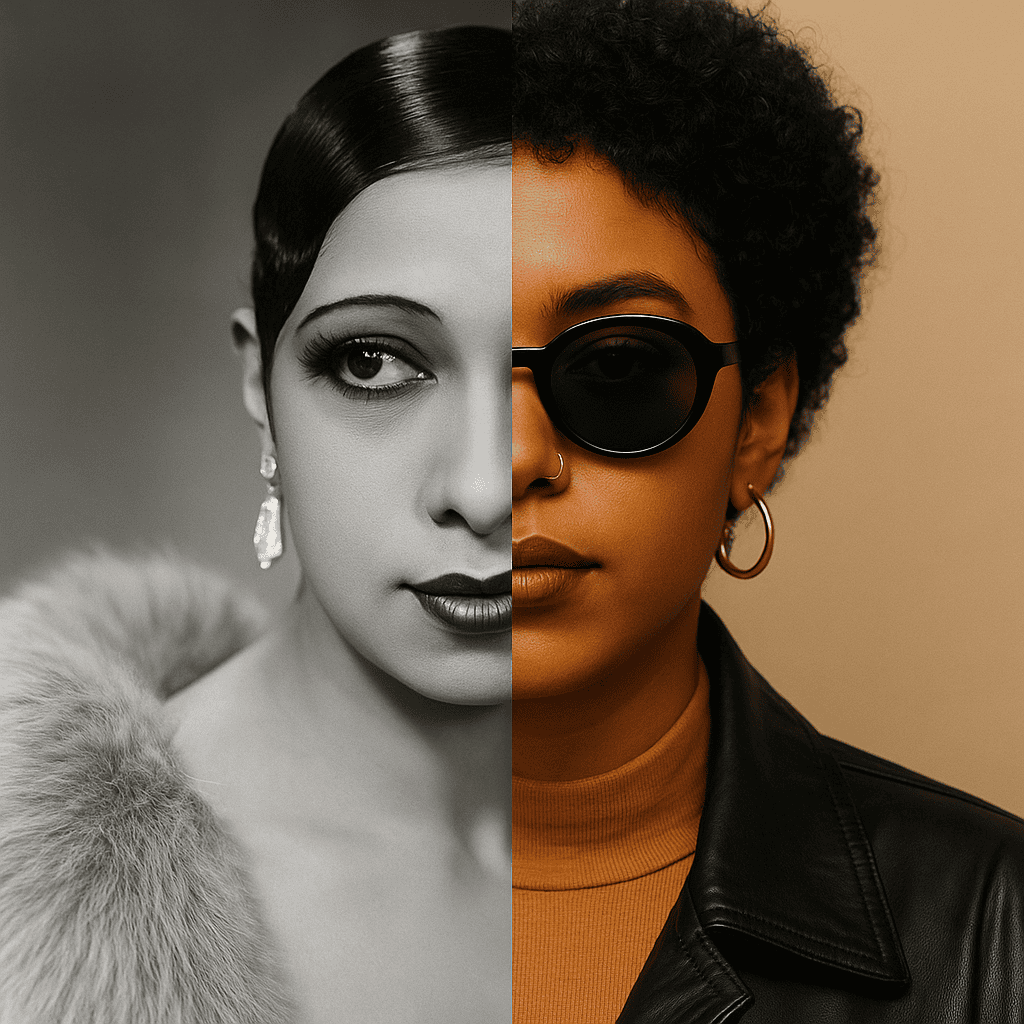History has a habit of softening the women it fears most. It’ll call them beautiful, exotic, alluring—anything but dangerous. And Josephine Baker was dangerous. Not because she danced. Not because she wore bananas like armor and disarmed men with a laugh. But because behind the stage lights and silk gloves, she was building something that no one could touch: a blueprint for how to infiltrate an empire without ever raising suspicion.
And she did it all wrapped in satin.
Let’s tell the truth. Josephine Baker wasn’t just an entertainer. She was a spy. A war hero. A strategist. A Black woman who used her body the way nations use missiles—aimed, intentional, and designed to hit without warning. She held state secrets inside sheet music. She carried coded messages between resistance fighters while the Nazis kissed her hand. She let them underestimate her. Let them think the feathers meant foolishness. Let them believe she was just a songbird. And while they watched her shake onstage, she was slipping intel through borders and hiding fugitives in her mansion.
And here’s what’s wild: most Americans still have no idea.
Because America doesn’t teach about Black women who were too clever to be contained. Too poised to be profiled. Too bold to be boxed in. They don’t teach about Josephine Baker because her story would force people to confront the lie that beauty, intellect, and militancy can’t exist in the same skin. They don’t teach her because she didn’t just survive history—she subverted it.
Now imagine her in 2025.
Imagine Josephine in a world where fascism is on the ballot and white nationalism is hiding behind school board seats and police pensions. Where politicians quote Dr. King while passing laws that silence everything he stood for. Where Florida bans Black history and calls it progress. Where border patrol rounds up children in the name of national security. Where AI scans your face while pretending not to see your humanity. Where the system doesn’t just oppress—it adapts. Faster. Smarter. Smoother.
If Josephine were here now, she wouldn’t be trending for her TikTok dance. She’d be running an underground resistance network through burner apps disguised as beauty filters. She’d be slipping encrypted data into the metadata of viral music videos. She’d host charity galas for the elite while syncing their phone data with human rights databases. She’d fund digital safehouses. She’d throw off surveillance systems with deepfakes of herself performing while she crossed borders unnoticed. And when the state tried to pin her down, she’d disappear into the crowd like smoke from a silk glove.
Because Josephine Baker never played the game. She rewrote the rulebook.
And that energy? That intelligence? That kind of divine deception? That’s exactly what this moment demands.
We are living through the soft roll-out of fascism. The boots are quieter now. The uniforms less obvious. The erasure comes with smiles. The control is algorithmic. We’re told to behave. To be patient. To “trust the system” while the system turns our memories into crime scenes. Our history into contraband. Our children into suspects. And our truth into conspiracy.
And still, we’re told to glow up.
Still, we’re pressured to keep it cute. To brand our pain. To be palatable. To perform progress without ever holding power.
But Josephine would never. She didn’t glow up. She grew dangerous.
She knew that glamor without purpose was a trap. That applause could be a leash. That sometimes the most revolutionary thing a Black woman could do was move like she belonged anywhere and mean it. Even if the world wasn’t ready.
When she walked into Nazi territory, she did so with grace and grit braided together. She didn’t kick down doors—she had them opened for her by the very people she planned to destroy. That’s not luck. That’s literacy in systems. That’s elegance weaponized. That’s what it means to grow through oppression, not just around it.
And she paid the price. Rejected by America. Followed by the FBI. Shut out of stages she helped build. Her name wasn’t just blacklisted. It was blacked out. Because no empire wants to admit it was fooled by a Black woman in pearls.
But fooled it was. Again and again. And that’s the part they hope you don’t remember.
So here’s the challenge: What would Josephine do today? Would she post a thread? Drop a single? Start a nonprofit? Maybe. But she’d also be ten steps ahead. Watching, planning, smiling for the cameras while mapping her next move in the silence. She’d have resistance coded into art. She’d have a team of queer Black hackers leaking ICE data to the world. She’d raise funds for trans refugees at her fashion shows. She’d crash CPAC dressed as the main act, then slip out the side door with hard drives full of donor records. And she’d do it all without ever raising her voice.
Because real power doesn’t have to scream. It knows the game. It becomes the stage.
This country is full of Josephines right now. Black women and femmes building in the shadows. Organizing beneath the hashtags. Funding liberation through side hustles. Raising babies while teaching resistance. Speaking truth in spaces that demand silence. They aren’t always famous. But they are always watching. Always building. And when history looks back, it will pretend it didn’t see them—just like it pretended not to see her.
But we see her.
We see the blueprint in every bold step we take. We see her in every time we outsmart a system that was never designed for us. We see her in the fire it takes to be soft and strategic at once. In the way we use beauty as cover and art as protest. In the way we turn culture into currency and make our survival look like luxury. That’s Josephine. That’s us.
So no—we’re not glowing up anymore.
We’re growing dangerous.
We’re growing informed.
We’re growing into the kind of people history can’t ignore, no matter how hard they try to erase us.
Because Josephine Baker didn’t just dance through history—she disrupted it. And in a time like this, when fascism is trying to rebrand itself as freedom, we need less performance and more precision. Less applause and more action. Less glow, more grow.
And when the next generation asks us what we did during this moment—this slow-burning coup disguised as democracy—we better have an answer worthy of Josephine.

Expanded: Spotlight: The Mission Inside the Music
The year was 1940. Europe was unraveling. Josephine Baker was no longer just France’s most famous Black entertainer—she was an undercover agent of the Deuxième Bureau, the French military intelligence agency. And she was about to risk everything.
She walked into a party hosted by Axis sympathizers with sheet music tucked beneath her arm. Onlookers thought she was preparing to perform. They had no idea those music sheets were laced with invisible ink—coded intelligence gathered from diplomats, smugglers, and military contacts. Names. Numbers. Routes. Orders. Lives.
Instead of delivering a setlist, she delivered war secrets. She danced while Gestapo officers watched, never realizing she was copying their movements and facial tics for later identification. She listened, smiled, remembered everything. And when the party was over, she didn’t go home. She went deeper into the shadows, smuggling intel across borders while pretending to tour.
At one point, when Nazi suspicion mounted and Baker was hospitalized for an emergency appendectomy, she continued to hide messages inside her corsets, her luggage, even her jewelry boxes—pain be damned. She used her stardom like a passport, slipping past borders no ordinary spy could cross.
And did she ever get to face the men she exposed?
In a way, yes—but not with shackles or courtroom victories. Josephine Baker’s justice wasn’t vengeance. It was exposure. It was the fact that men who plotted genocide were taken down, in part, by the woman they underestimated. A Black woman. An American exile. A dancer with deadly memory. The Nazis didn’t just lose battles—they lost face. And Josephine never had to raise her voice. Her elegance was her knife.
History won’t tell you that some of those same men—after the war—resurfaced in European politics, protected by silence and cowardice. But she knew. She always knew. And she walked taller anyway.
Because for Josephine, the greatest revenge wasn’t violence.
It was survival.
It was legacy.
It was the echo of her laughter in rooms where they thought she’d never belong.

